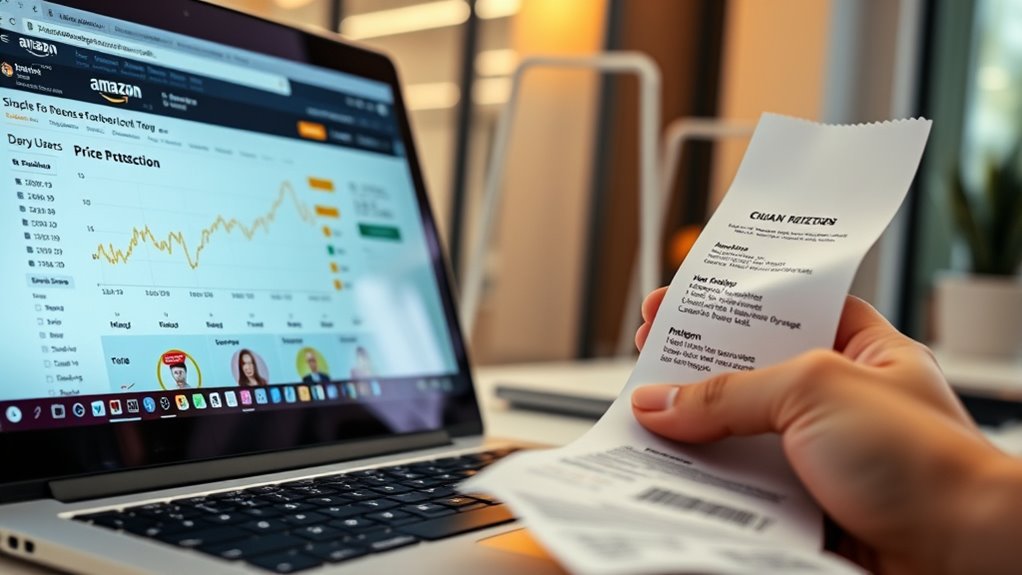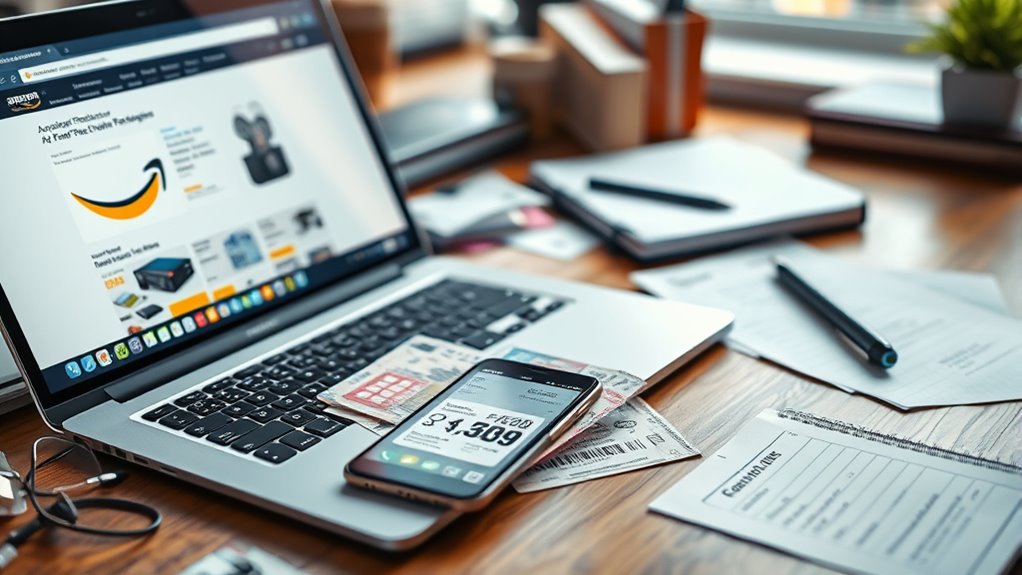Amazon’s price-protection policies show that coupons and deals usually don’t qualify for refunds or adjustments after your purchase. If you use a coupon, Amazon won’t automatically refund you if the price drops later. Your best bet is to be proactive and compare prices before buying, as they don’t match lower prices found afterward. Keep in mind that understanding how coupons and deals work can help you make smarter buying decisions—continue to explore to learn more.
Key Takeaways
- Amazon does not offer refunds or price adjustments if prices drop after purchase, regardless of coupons used.
- Coupons provide upfront discounts but do not qualify for post-purchase refunds due to price drops.
- Amazon explicitly states they do not match lower prices found elsewhere after a purchase.
- Price history influences the “was price” but does not trigger refunds or protections.
- Coupons are promotional tools, not mechanisms for price protection or post-purchase reimbursement.

Price-Protection Policies
Ever wonder how Amazon‘s price-protection policies impact your shopping experience? When you shop on Amazon, it’s important to understand that their policies around coupons and price protections are quite specific. Unlike some retailers, Amazon doesn’t automatically offer refunds if the price drops after you purchase an item, even if you used a coupon. Instead, they focus on upfront discounts through coupons and promotional deals. These coupons must meet certain criteria to be valid, such as offering a discount between 5% and 50% and being lower than the product’s “was price” or recent lowest price. This means that if a coupon doesn’t meet these rules, it won’t apply, and you won’t get the associated savings. Sellers are responsible for ensuring their prices and discounts comply, but Amazon doesn’t intervene to adjust prices retroactively.
Starting January 16, 2025, Amazon introduced a new way to determine deal prices based on recent transaction prices, specifically looking at the lowest coupon transaction in the past 30 days. This policy limits deal discounts to a maximum of 15% off that lowest recent price, preventing deep discounts from remaining forever. The deal prices are dynamic, adjusting based on current market conditions and seller prices, but once a deal runs, it can’t be increased. This approach aims to keep pricing competitive and transparent, but it also means that if you buy a product with a coupon, Amazon doesn’t guarantee a refund if the price drops afterward. The price history, such as the median prices paid over the last 90 days, factors into the “was price” used for calculating discounts, but it doesn’t trigger any refund or price match. Understanding the pricing system can help consumers make more informed decisions]. This policy encourages consumers to make purchases promptly rather than waiting for potential price drops.
Amazon’s policies clearly state that they do not match lower prices found elsewhere, nor do they offer refunds for price differences after purchase—whether or not a coupon was used. Coupons are considered promotional discounts, not price protection tools. If you see a lower price later, Amazon’s system doesn’t automatically reimburse you. Their focus is on offering discounts upfront, through coupons or programs like Prime or Subscribe & Save, rather than providing post-purchase price adjustments. Buyers need to stay vigilant and monitor prices actively, as Amazon’s price-protection policies don’t support refunds based on subsequent drops. Essentially, your savings come through pre-purchase discounts, not through refunds or price adjustments after the fact. This setup emphasizes the importance of timing and careful price checking before completing your purchase.
Frequently Asked Questions
How Do Coupons Influence Amazon’s Refund Policies?
Coupons mainly affect your refund amount on Amazon by adjusting the final purchase price. When you return an item, the refund typically matches the discounted price you paid, not the original. Using coupons doesn’t usually disqualify you from refunds, but fraudulent reuse can lead to issues. Keep in mind, Amazon’s refunds are based on the actual amount paid, including discounts, and coupons don’t impact price protection policies.
Are Price-Protection Policies the Same Across All Product Categories?
You might think all product categories have the same price-protection policies, but that’s not true. Amazon doesn’t offer uniform price protection across categories; it relies on dynamic pricing instead. Many categories, like jewelry or electronics, have specific exclusions. Coupons don’t trigger refunds because Amazon’s prices fluctuate automatically. So, your eligibility for refunds or adjustments depends on the product type, not a standard policy, making it essential to check each category’s rules.
Can Customers Use Coupons to Get Refunds on Price Drops?
You might wonder if coupons affect refunds on price drops. Generally, coupons don’t influence your eligibility for refunds or the amount you get back. Refunds are based on the actual amount paid after applying the coupon, not the original price. Using coupons doesn’t guarantee extra refunds if the price drops later. If you notice a lower price, contact Amazon quickly, but coupons usually don’t impact your ability to get a refund for a price decrease.
What Is the Typical Time Frame for Price Protection Claims?
The typical time frame for price protection claims on Amazon is within 7 days of delivery. You need to actively request a price adjustment during this window, as it’s not automatic. After submitting your claim, Amazon reviews it, and refunds usually process within 3 to 10 business days for credit or debit cards, or 2 to 3 hours for gift cards. Outside this period, you’ll need to explore returns or other options.
Do Refunds Include the Value of Coupons Used During Purchase?
Think of a refund as a refund as a refund—like a mirror reflecting what you paid, not the original price. When you buy with a coupon, Amazon refunds only the amount you actually paid after discounts. The coupon’s face value doesn’t get refunded separately. So, if you used a coupon, your refund will match the discounted price, not the full original cost, ensuring the seller isn’t overcompensated.
Conclusion
So, next time you use coupons, next time you seek a refund, remember that price-protection policies aim to safeguard your savings, but coupons can influence the process. Be aware of the nuances, understand your rights, and act quickly. Know that clarity, confidence, and communication are your best tools. Stay informed, stay proactive, and guarantee that your shopping experience remains fair, transparent, and rewarding. Your awareness makes all the difference in getting the refunds you deserve.









